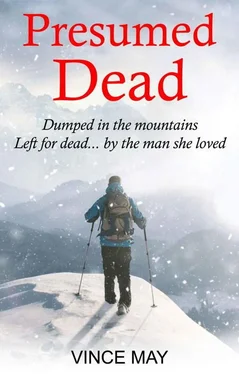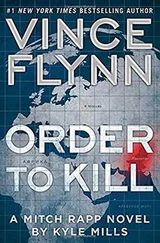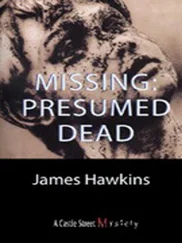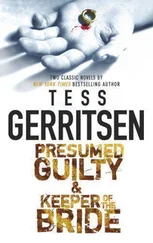Walking out of the barn, Hubbard looked over towards the farmhouse where he could see two fire engines starting to play water onto the roof, which was still burning fiercely. ‘There goes the Crawford case,’ he said shaking his head. ‘Forensics were due to go back in tomorrow and go over the entire house with a fine-tooth comb. If there was any other evidence in there, it’s gone now.’
‘But he’s proved his guilt by making a run for it,’ Butcher reasoned.
‘You know that, and I know that, but try making it stand up in court,’ Hubbard said dejectedly, as he walked towards the car punching numbers into his cell phone.
Hubbard’s call to the supervising controller at Gatwick was answered quickly. Once he’d introduced himself, he asked, ‘Any more news on Webley’s aircraft?’
‘He’s turned onto a heading of one-three-six degrees and climbed to twelve thousand feet. Still not responding to repeated radio calls. In another few minutes he’ll be out of English airspace.’
Hubbard swore under his breath. ‘If he sticks to his new course, where will it take him?’
‘Hold on, I’ll just check on the chart,’ the controller replied. Coming back half a minute later, he said ‘A course of one-three-six from his present position will take him over the northern suburbs of Paris then on down towards Lake Geneva. Nothing much to get in his way at twelve thousand feet until he gets to the Alps.’
An alarm bell rang in Hubbard’s mind. ‘I think I know where he’s going!’ he said excitedly. ‘What can we do to stop him?’
‘In about another three minutes, absolutely nothing. He’ll be in French airspace.’
‘Damn!’ Hubbard exploded, ‘Who can I speak to over there, do you know?’
‘Best person would be my opposite number at Orly. I don’t know the name, but I can give you a number if you like.’
Hubbard noted the number, thanked the controller, then rang off. While he’d been talking, a battered Landrover had made its way up the track and parked nearby. Hubbard and Butcher walked over to it as an old man climbed out of the cab. ‘Who are you?’ Hubbard asked, flashing his warrant card.
‘I’m Harry Perkins,’ the old man replied, ‘I look after the aircraft here. I saw all the commotion from the village and thought Sir Ross had had an accident.’
‘It wasn’t Webley,’ Hubbard said, ‘it was a police helicopter. Now you’re here though, maybe you can help. The big twin that’s normally kept here, what type is it?’
‘She’s a Cessna 421B, known as a Golden Eagle,’ Perkins replied.
‘How fast can it go?
‘Depends on how high you fly her.’
‘Say, twelve thousand feet. How fast will it go at that height?’
Perkins thought for a moment then said, ‘I’d say between two-thirty and two-fifty, depending on the power setting.’
‘Miles an hour?’ Hubbard asked, making notes.
‘Yes.’
‘Now, what about distance,’ Hubbard asked, ‘how far can it go.’
‘On full tanks, about fifteen-hundred miles,’ Perkins replied.
‘And were the tanks full?’
‘Yes, I filled them myself when Sir Ross came back on Thursday. He hasn’t used her since.’
‘Thank you,’ Hubbard said, closing his notebook. ‘You’ve been very helpful.’ As they walked back to the car, he said to Butcher, ‘Come on, let’s get over to the local nick in Lewes. We need a base to work from.’
Twenty minutes later they were installed in the incident room at Lewes Police Station, which had been set up to cover the Crawford shooting. Hubbard put a call through to the Paris Air Traffic Control Center, and after explaining who he was and what he wanted, found that his information was very welcome. The supervising controller told him they had been going crazy trying to contact the unidentified aircraft that had entered their airspace without clearance at 15:23 local time.
‘Can you confirm his heading is still one-three-six?’ Hubbard asked.
‘That’s affirmative,’ the supervisor replied in heavily accented but technically correct English. ‘His altitude and heading have not varied at all since he entered our airspace.’
‘What do you intend to do?’ Hubbard asked.
‘If we get no response in the next few minutes, I will request the Air Force send a fighter to escort him down.’
‘That would be perfect,’ Hubbard said with satisfaction. ‘Please remember, he is a wanted criminal. Will you be able to have the police detain him when he lands?’
‘Of course Monsieur, he has already broken several laws, he will be arrested anyway. If you give me your number I will call you back as soon as I know where he will be landing.’
Hubbard gave him the incident room number, thanked him, then rang off. ‘All we can do now is wait,’ he said as he replaced the receiver. ‘Let’s see if we can get some coffee.’
Half an hour later the telephone rang. Hubbard snatched it up and heard the distinctive accent of the French supervisor. ‘I’m afraid we have a problem,’ the Frenchman said.
‘What sort of problem?’ Hubbard asked anxiously.
‘The Air Force sent two Mirage jets to intercept the Cessna, but they could not get the pilot to respond to their signals. One of them flew very close and could see the pilot slumped forward in his seatbelt. He appeared to be unconscious.’
Hubbard’s mind raced as he tried to digest the information he was being given. Heart attack, he wondered, suicide? The supervisor was speaking again, ‘The Air Force has taken over responsibility for this now. They are projecting the track of the aircraft forward. If it looks like it will crash in a populated area, they will shoot it down.’
The words snapped Hubbard back to attention. ‘They can’t do that!’ he protested.
‘I’m afraid they can, and they will, if they need to,’ the Frenchman assured him. ‘Now, they have asked me to get some more information. Do you know how much fuel the Cessna has on board?’
‘It was full when it took off,’ Hubbard replied, ‘that should give it a range of over a thousand miles.’
‘Good, at least it should clear French airspace. If it keeps going as it is, it should crash into the Mediterranean.’
‘Is it high enough to clear the Alps?’ Hubbard asked.
‘Standby, I have just been handed a message from the Air Force.’ Hubbard waited a few seconds then heard the supervisor say, ‘You are right, they predict that the aircraft will crash into the mountains just south of the town of Chamonix in the French Alps.’
At the mention of the name Chamonix, Hubbard knew he was right. ‘What time do they estimate the crash will occur?’ he asked.
‘Let’s see,’ the supervisor murmured, ‘16:57 local time, just under one hour from now.’
.
Down in Chamonix, Batard was sitting at his desk, speaking to a senior French Air Force commander on the telephone. ‘We’ve got a rogue aircraft heading your way at an altitude of 3,700 meters,’ the commander was saying calmly, ‘the pilot is unconscious, probably dead.’
Batard’s blood ran cold as the commander carried on. ‘No need to worry, we’ve projected its track forward and calculated the exact point of impact to be in an unpopulated area to the south of you.’
‘Where exactly?’ Batard managed to ask.
‘Let me have a look… ah, here it is. Four kilometers south of Chamonix on the north face of a 3,842 meter peak named L’Aiguille du Midi,’ the commander said nonchalantly. ‘The civil aviation boys will get a team down there tomorrow to pick up the pieces.’
Batard felt a cold sweat break out on his forehead. ‘Commander,’ he said urgently, ‘you’ve got to stop that aircraft before it gets here. There’s a huge cable-car station on the summit of L’Aiguille du Midi which at this time of day is packed with hundreds of visitors!’
Читать дальше












